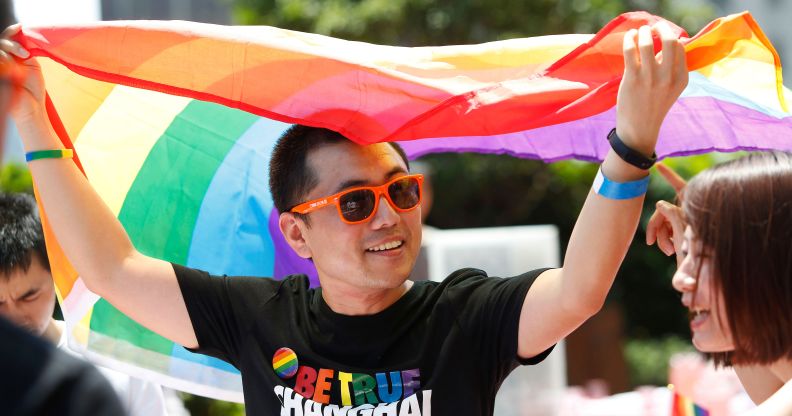Same-sex couples in China name each other as legal guardians

A man holds a rainbow flag after taking part in the Pride Run in Shanghai on June 17, 2017. (STR/AFP/Getty)
Same-sex couples in China are naming each other as legal guardians to give them access to some of the benefits they would receive if they were allowed to marry.
Li Chenyang, assistant director of a public notary office in Shanghai, told Chinese site Sohu that he had seen “one or two same-sex couples almost every month” coming to apply for guardianship notarisation.
China changed its guardianship laws in 2017, meaning that any adult can nominate a legal guardian, rather than only those over the age of 60 or with reduced mental capacity.
Legal guardianship means that same-sex couples in China are able to make medical decisions for each other and have inheritance rights.
Chenyang said: “In China, same-sex marriage has not yet been legally recognized, but the needs of same-sex couples have emerged.
“They also have the problems of medical care, old-age care, and wealth inheritance, and sometimes even more acute than other people.”
He said that many LGBT+ people in China are not in touch with their biological families, who would otherwise make these decisions, because they don’t accept their sexual orientation.
“We do notarisation, but also hope to make up for some legal gaps and solve the social problems that have arisen,” he added.

A participant prepares for a Pride Run, an event of ShanghaiPRIDE. (JOHANNES EISELE/AFP/Getty)
Mutual guardianship for same-sex couples is not a simple process
However, Sohu reports that mutual guardianship for same-sex couples is not a simple process as some notaries will not see them, or will not be accepting their situation.
The first case of successful guardianship notarisation for a same-sex couple was a lesbian couple in 2018.
It took a six-hour meeting for the notary office to allow it; reportedly the main issue was whether it would “harm the public order and good customs.”
Although homosexuality was decriminalised in 1997, the LGBT+ community experiences violence and discrimination, and around 85 percent of LGBT+ students in China report struggling with depression.

